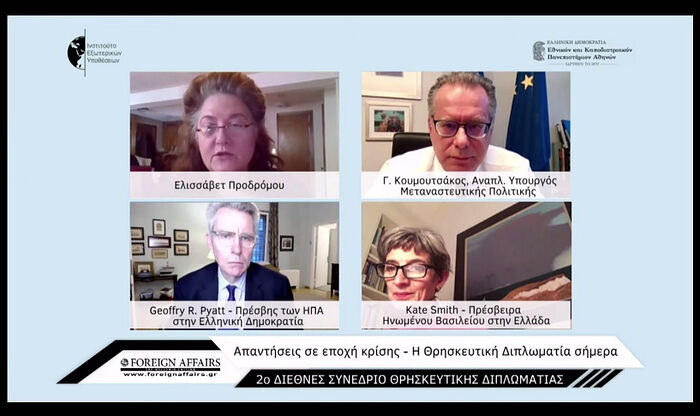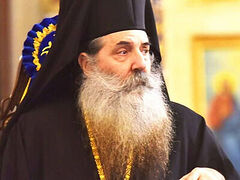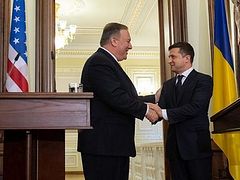Athens, December 11, 2020
On December 9, U.S. Ambassador to Greece Geoffrey Pyatt participated in the virtual Foreign Affairs International Conference on Religious Diplomacy, making a number of bold claims about the relationship of the Churches of Russia, Greece, and Constantinople towards religious freedom.
Pyatt is well known as the former Ambassador to Ukraine who helped organized the Maidan revolution in 2014 and who has had considerable influence upon important Greek hierarchs and their political decisions since being appointed to Greece under President Obama.
Before turning to Russia, the Ambassador emphasized the “shared democratic values,” including religious freedom, that link the American and Greek people. “Americans deeply respect the Greek Orthodox Church, which preserved Greek culture through centuries of Ottoman rule,” Pyatt said.
The Greek Church in America shows “courageous moral leadership,” he said, pointing to Archbishop Elpidophoros’ participation in a Black Lives Matter protest in the spring.
In Pyatt’s estimation, Abp. Elpidophoros has been a key player in strengthening the ties between Americans and Greeks, and the Ambassador is proud to count him as a friend and collaborator who has shown great leadership and compassion in response to the COVID pandemic and who “has helped Americans in our journey to perfect our democracy by standing in solidarity for a more just and equal society.”
“And of course, the U.S. government is a strong supporter of the Ecumenical Patriarch, the spiritual leader of Orthodox Christians around the world,” Pyatt declared, adding that this support will remain strong under President-elect Biden, who has met with Pat. Bartholomew several times.
And turning to one of his familiar topics, Pyatt, who has been described as a “Russian hate figure,” emphasized that Greece and the U.S. work together to respond to the “challenge that Russia poses to our democratic values and specifically to the freedom of religious expression here in Europe.”
Russia has been deemed a “country of particular concern” by the U.S.’s Commission on International Religious Freedom, Pyatt noted.
For the Ambassador, Russia is to blame for not supporting Constantinople’s claims for itself, and in his estimation, it is to blame for the schism that has arisen from Constantinople’s intervention in Ukraine:
Not only does Russia challenge the authority of the Ecumenical Patriarch, but it has continued seeking to break the unity of the Orthodox Church by fomenting instability and undermining the sovereignty of independent Orthodox-majority nations.
And speaking from a political point of view, Pyatt follows the Constantinople line of interpreting the Russian Church’s reaction to the invasion of its ecclesiastical territory as threats and punishments:
Last year, when the Ecumenical Patriarch granted autocephaly to the Orthodox Church of Ukraine in accordance with the wishes of the Ukrainian people, Russia responded by breaking ties with His All Holiness. The Russian Orthodox Church then proceeded to cut ties or threatened to cut ties with other churches that have followed the Ecumenical Patriarch’s lead.
However, the Ambassador fails to note that it is a minority of Ukrainians who supported or even cared about the creation of the “Orthodox Church of Ukraine.”
Further, the Ambassador declared that the Russian Church has attempted to “punish Greece” by telling pilgrims not to visit the dioceses of the bishops who support Constantinople’s interference in Ukraine.
“And just this month, Metropolitan Hilarion, on behalf of the Russian Church, falsely claimed that the Ecumenical Patriarch had initiated a schism,” the Ambassador added.
“We commend the Church of Greece and Archbishop Ieronymos for bravely supporting the Ecumenical Patriarch’s decision, and we hope that over time, other Orthodox churches will follow this lead in accordance with canon law. Eventually, we hope the Russian Church will reconcile with the Church of Ukraine, recognizing the sovereign right of the Ukrainian people to choose their own future and own means of worship,” Pyatt said.
Unfortunately, the Ambassador failed to address the fact that after Constantinople’s intervention in Ukraine, hundreds of Ukrainian communities have been deprived of their rightful place of worship by persecutorial local and state authorities and violent schismatics who are in communion with Constantinople.
The United States is proud to stand with Greece and Constantinople in its quest to protect religious freedom throughout the world, which it sees “as both a moral and national security imperative,” the Ambassador emphasized.
Follow us on Facebook, Twitter, Vkontakte, Telegram, WhatsApp, Parler and MeWe!





